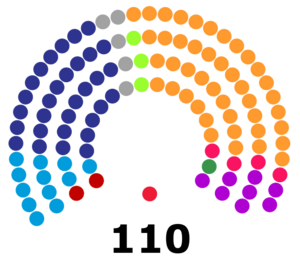Parliament of Liberto-Ancapistan
Parliament of Liberto-Ancapistan Parlementoya Libertarya-Ancapistane | |
|---|---|
| 35th Parliament of Liberto-Ancapistan | |
 The logo of the Liberto-Ancapistanian Parliament. | |
| Type | |
| Type | |
| Houses | House of Asagi House of Commons |
Term limits | none |
| History | |
| Founded | 14th July 1955 |
| Leadership | |
Meyan Ibrahim, nonpartisan since 12 May 2017 | |
Irene Deremir-Montera, nonpartisan since 4 June 2019 | |
| Structure | |
| Seats | 610 Asagi: 110 MPs: 500 |
 | |
House of Asagi political groups |
|
 | |
House of Commons political groups |
|
Length of term | 5 years (House of Asagi) 2 years (House of Commons) |
| Elections | |
House of Asagi voting system | Single transferable vote |
House of Commons voting system | First-past-the-post |
House of Asagi last election | 8 June 2025 |
House of Commons last election | 28 June 2024 |
House of Asagi next election | By July 2030 |
House of Commons next election | 3 April 2026 |
| Meeting place | |
| Birca Parlementoye, Bajazad | |
The Parliament of Liberto-Ancapistan (Basaquese: Parlementoya Libertarya-Ancapistane) is the bicameral legislature of Liberto-Ancapistan, consisting of the House of Commons (lower house) and House of Asagi (upper house).
Both the House of Commons and House of Asagi meet in Birca Parlementoye (transl. Parliament Tower), Bajazad. The Parliament is elected by universal, free, equal, direct and secret suffrage. It consists of 610 members, including 500 Members of Parliament (MPs) and 110 Asagi. The House of Commons is elected on two-year intervals by first-past-the-post in individual constituencies, while the House of Asagi is elected on five-year intervals by single transferable vote in multi-member electoral districts. The House of Asagi is significantly less powerful than the House of Commons, as it does not have the power to block bills, only being able to delay them for the remainder of a parliamentary term.
As Liberto-Ancapistan has a parliamentary system of government, the Parliament is responsible for confirming and dismissing the Chancellor of Liberto-Ancapistan and their government. The Qanum Mezigh, the constitution of Liberto-Ancapistan, may only be modified by a two-thirds majority vote in both houses, while all other votes operate by simple majority. According to the Qanum Mezigh, the Parliament of Liberto-Ancapistan is collectively its head of state, though this is a largely symbolic distinction practically held by the speakers of both houses, who weild significant authority.